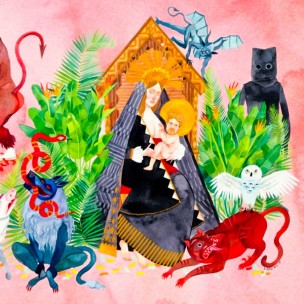Love and music. It’s a combination that has constantly and consistently worked throughout history. Hell, the oldest song in recorded history is a love song. The combination worms its way into the brains of listeners with unrivaled force and efficiency. Joshua Tillman knows this. Last week, the drummer/guitarist/singer—an ex-Fleet Foxes member and skilled solo artist—released a great experiment in the love song. In I Love You, Honeybear, his second album under the name Father John Misty, well-articulated cynicism and misanthropy give way to transcendent sincerity. It’s the kind of love that listeners crave, expressed over 11 bruised, complex, and ultimately triumphant songs.
Tillman, working with producer Jonathan Wilson, creates beautiful, grounded compositions. Each instrument in the mix is calibrated for maximum clarity. Tillman is known for his buoyant takes on psych-rock and folk-rock, but that only covers a few of the many different genres that Honeybear dabbles in. There’s the self-parodying piano schmaltz of “Bored in the USA,” the mariachi horns of single “Chateau Lobby #4 (in C for Two Virgins),” the light Postal Service influenced drum programming of “True Affection,” and the honky-tonk blues of “Nothing Good Ever Happens at the Goddamn Thirsty Crow.” There’s a restlessness among these songs and styles that gives Honeybear an appealing momentum. Despite the album’s refusal to stay within one genre, this is very much a cohesive work of art, largely thanks to Tillman’s voice. It’s a voice that implies honesty and sincerity, regardless of concept.
Honeybear is a sonically pleasing record, and its strong melodies, clear production, and varied styles exist to serve Tillman’s complex, funny, long-winded, leave-no-stone-unturned lyrics. In the time between his first album and Honeybear, Tillman met and married Emma Elizabeth Tillman; his new wife is the central, unifying force of this album’s lyrics. The stunning title track, the album’s opener, is a remarkable balance of darkly funny and beautiful. Like many of these tracks, this is an ode to Emma. Tillman manages to successfully sell silliness (“You’re bent over the altar, and the neighbors are complaining/that the misanthropes next door are probably conceiving a Damien”) and uncomfortable honesty (“We brought my mother’s depression you’ve got your father’s scorn, and a wayward aunt’s schizophrenia”), and center them around the title’s declaration of absolute devotion. It’s a remarkable song on an album of remarkable songs.
Not every song on Honeybear is a love song, though. The hilariously brutal “The Night Josh Tillman Came to Our Apt.” paints a picture of a former lover Tillman finds unbearably irritating. There are few more effective kiss-offs than, “She says, like literally, music is the air she breathes, and the malaprops make me want to fucking scream.” This track works because Tillman is the one who comes out of it looking shameful. The way he picks apart this probably harmless person makes him seem like a genuinely bad guy, taking advantage of a girl while he insults her. Laughing at it is both disconcerting and encouraging, and that makes this a stunningly effective work.
The same can be said of “Bored in the USA.” The album’s lead single, “Bored” is an overwhelmingly woe-is-me take on first world problems. Tillman’s fixations on American housing, drug culture, and education come across as knowingly petty, but they are sung with such dedication that they cannot help but be captivating. The maudlin schmaltz is undercut by the sound of canned laughter, a studio technique that makes the song sadder and more distant. It takes a special kind of musician to make the line “Save me, White Jesus!” work.
The strongest material on the album comes in the form of the last two tracks: “Holy Shit” and “I Went to the Store One Day.” The former, written on the day of Tillman’s wedding, is the kind of song that folk singers dream about writing. Tillman attempts to contextualize the most important event of his life so far within history, and ultimately concludes that his wedding is both too significant and insignificant to think of in these historical and existential terms. All of this comes in the form of half-finished phrases, strong melody, and deeply affecting guitar work. The song’s final line, “Maybe love is just an economy based on resource scarcity, what I fail to see is what that’s gotta do with you and me,” reads like an act of enlightenment and defiance, a “fuck you” to rationalization that embraces his own feelings and circumstance.
Even that song pales in comparison to “I Went to the Store One Day,” an open-hearted, tearful, unblinking work. This is one hell of a love song. It details the first time that Tillman ever encountered his wife, in the parking lot of a grocery store, and grows from there, mixing concrete details and hypotheticals. Every word feels like a tearful confession, an unbreakable vow. If there’s anything to learn from I Love You, Honeybear, it’s this: even after centuries, there’s still unbelievable power in the love song.

Comments are closed